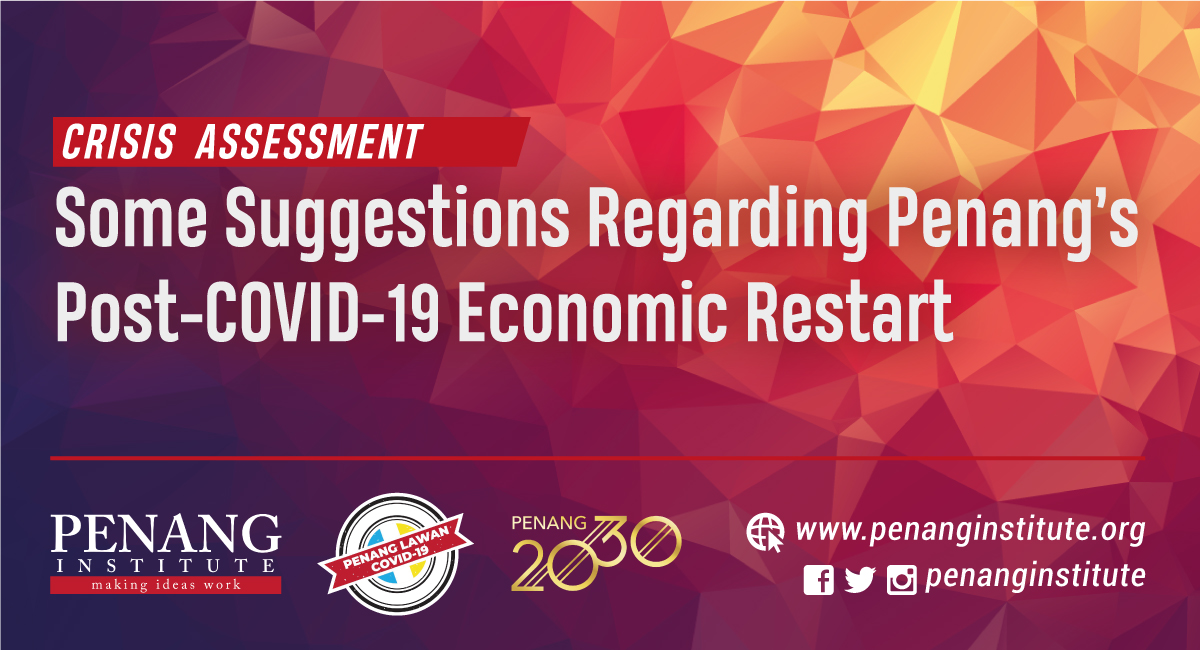The State of Penang has fared relatively well since the Covid-19 pandemic began and the Movement Control Order was put into place on 18 March 2020. The MCO has since been extended twice, and at the time of writing, will end on 28 April, 2020. Caution, discipline and good information flows have been critical to the positive development in Penang under the MCO. While the State Government, in line with measures undertaken at the federal level, has implemented well-appreciated and successful measures and released stimulus packages to assist those most badly hit economically by the lockdown, and the supply of essentials and of foodstuff has been efficient and reliable throughout the state, an overhanging worry has been the coming transition into the post-MCO period. The health and wealth conditions of Penangites are therefore a major concern for the State Government in the medium term. Below are some ideas to assist the government in managing a return to normalcy – or more dramatically put, handling the new normal that many of us on good grounds are expecting.
1. The TIMING for emergence out of the Movement Control Order and for restarting the economy, is when we are sufficiently confident that we have a situation of “high system readiness and low virus spread”. In short, the healthcare capacity must be at a point when it is prepared but not overburdened and the number of cases a low and stable, or declining.
2. The matter of PRIORITISING which sectors and subsectors to support and to restart first needs to be properly studied. State spending should be targeted at GDP-productive areas where possible, taking into consideration:
a. the contribution of the sector/subsector to the overall economy;
b. the contribution of the sector/subsector to employment;
c. the vulnerability of jobs within the sector/subsector, and;
d. the health-relevant environment within the sector/subsector.
In Penang, the Manufacturing Sector as a whole has the highest value added (54.3% in 2015), while the Services Sector (45.4% in 2015) keeps the most people employed. The threat of unemployment in Services has most probably been the stronger.
3. Policies and protocols to ascertain safety and health will be essential for each sector. Recommendations are as follows:
a. Remote working: encourage remote work for the next 3-6 months; create remote work policies and offer productivity incentives for employees;
b. Physical distancing: continue practicing distancing between people; establish a regulation of maximum persons allowed in one place;
c. Temperature and control: temperatures to be monitored daily; request employees to quarantine if the slightest of Covid-19 symptoms shows up;
d. Health and hygiene: hand sanitisers to be made available at each workplace; daily disinfection procedures; promote mandatory health and hygiene measures for employees;
e. Reporting: keeping the relevant health authorities updated by reporting cases of Covid-19 systems;
f. Enforcement: Perform random checks across sectors to ensure compliance; fines imposed in cases of noncompliance.
4. Policies and protocols for the retail sector are proposed as follows:
a. Encourage e-commerce through the implementation of communication and marketing campaigns;
b. Implement tax exemptions for e-commerce;
c. Alternate remote work with face-to-face work as much as possible (especially for administrative staff – establishment of differentiated work shifts and differentiated check-in, food, check-out times);
d. Maximum capacity of stores should be restricted;
e. Large meetings to be held online;
f. Carpooling scheme for employees to prevent movement on public transport;
g. Set specific hours to serve high-risk population.
5. The use of technology and e-commerce: The Government should assist SMEs with building an online platform, educating and providing support on how to best utilise the platform and conduct business remotely. Strengthening of the logistics sector will be equally important in this regard. As luck would have it, the State Government had managed to establish just before the MCO took effect, Digital Penang Sdn. Bhd., an agency chaired by the Chief Minister. This is well placed as the platform that can help rebuild Penang’s economy and at the same time transform it into a strong digital economy – backed by enhanced e-governance, community digital literacy and reliable digital infrastructure.
6. Stimulating consumption/industry: shopping discounts primarily through the e-commerce platform. The duration of such campaign should be within the period of one to two months.
7. A comprehensive action plan needs to be formulated to jumpstart the tourism industry in Penang, by the way of discounted tour packages, shopping rebates for tourists, and so on. As a start, it is suggested that priority should be given to attracting domestic tourists, given the global economic recession. Incentives should be provided for businesses in the tourism industry to develop new business models. In the longer term, the tourism, medical tourism and MICE sectors should all be studied against the new global conditions affecting travel in general, in order to take full and early advantage of the radical and broad changes affecting this sector.
8. Any subsequent cash handouts must prioritise low-income groups, including the newly unemployed and the self-employed who have been badly hit by the MCO. These groups are most in need of credit during the crisis. Protecting their welfare is of utmost importance, since the long-term consequences for not doing so can be dire. Furthermore, low-income groups have the highest propensity to consume – almost all cash placed in their hands will be spent on basic goods and services, thus promoting economic growth for Penang’s SMEs.
9. As a subsidy to commercial and residential unit owners as well as owners of low-cost flats, the collection of parcel rent and quit rent could be temporarily halted. Similar to the property tax rebate that has been exercised in Singapore, savings in parcel rent and quit rent should be effectively passed on to tenants, for properties rented out. This will be of significant help in alleviating the burden on renters.
10. Employment support should be provided, with the ambition of turning this into a more permanent database and systemic structure for future contingencies. Mass unemployment must be expected, and workers will be displaced. Finding employment again will take time, and businesses will be forced to downsize or shut down completely. Providing employment support can be in the form of speeding up the matching process, or reskilling workers.
11. The public should be comprehensively educated on public health issues and food security issues. In Switzerland, for example, the government has consistently run public information campaigns educating its citizens on the steps to take in maintaining personal hygiene, maintaining a healthy and active lifestyle and advising citizens on how to adequately supply their households with food – a campaign that has been in place for the last 50 years. This has greatly helped to avoid panic buying and stockpiling, hence food security in Switzerland remains resilient.
12. Consistent communication and guidance from the state is essential. Reducing private sector uncertainty will help owners regain confidence in restarting or expanding businesses. Again, digital technologies are a necessary tool in this transformation of Penang’s economy.







